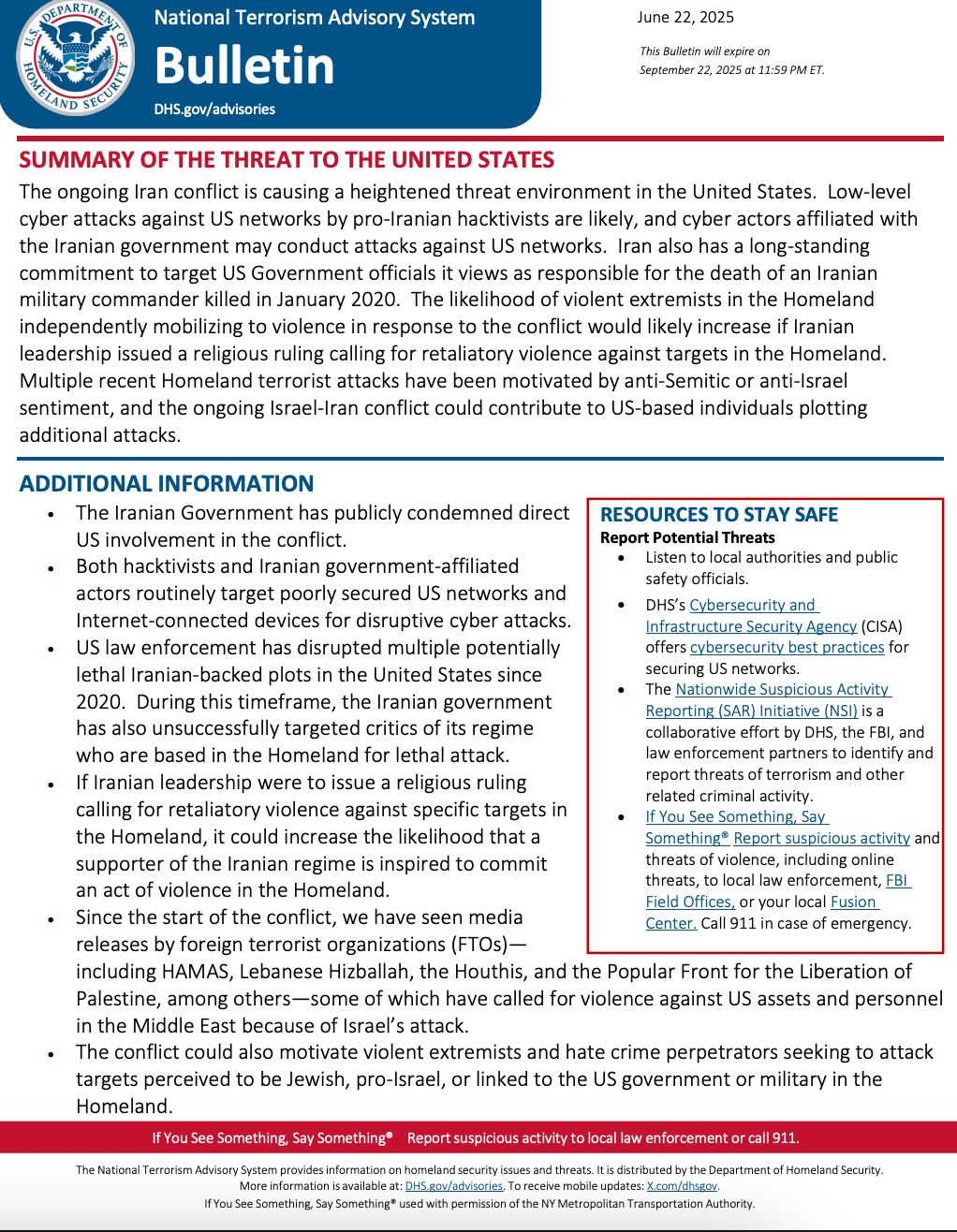WASHINGTON (AP) —The U.S. Department of Homeland Security issued a national terrorism bulletin Sunday warning of possible cyber attacks and violence, including antisemitic hate crimes, following U.S. attacks on Iranian nuclear sites.
The department said there are “no specific credible threats against the homeland,” but noted the Iranian government has condemned the U.S. action.
“A heightened threat environment across the United States” is expected to last throughout the summer, the bulletin said.

The ongoing Iran conflict is causing a heightened threat environment in the United States. Low-level cyber attacks against US networks by pro-Iranian hacktivists are likely, and cyber actors affiliated with the Iranian government may conduct attacks against US networks. Iran also has a long-standing commitment to target US Government officials it views as responsible for the death of an Iranian military commander killed in January 2020.
The likelihood of violent extremists in the Homeland independently mobilizing to violence in response to the conflict would likely increase if Iranian leadership issued a religious ruling calling for retaliatory violence against targets in the Homeland. Multiple recent Homeland terrorist attacks have been motivated by anti-Semitic or anti-Israel sentiment, and the ongoing Israel-Iran conflict could contribute to US-based individuals plotting additional attacks.
Duration
Issued: June 22, 2025Expires: September 22, 2025 at 11:59 PM ET
Additional Information
The Iranian Government has publicly condemned direct US involvement in the conflict.
- Both hacktivists and Iranian government-affiliated actors routinely target poorly secured US networks and Internet-connected devices for disruptive cyber attacks.
- US law enforcement has disrupted multiple potentially lethal Iranian-backed plots in the United States since 2020. During this timeframe, the Iranian government has also unsuccessfully targeted critics of its regime who are based in the Homeland for lethal attack.
- If Iranian leadership were to issue a religious ruling calling for retaliatory violence against specific targets in the Homeland, it could increase the likelihood that a supporter of the Iranian regime is inspired to commit an act of violence in the Homeland.
- Since the start of the conflict, we have seen media releases by foreign terrorist organizations (FTOs)—including HAMAS, Lebanese Hizballah, the Houthis, and the Popular Front for the Liberation of Palestine, among others—some of which have called for violence against US assets and personnel in the Middle East because of Israel’s attack.
- The conflict could also motivate violent extremists and hate crime perpetrators seeking to attack targets perceived to be Jewish, pro-Israel, or linked to the US government or military in the Homeland.
Resources to Stay Safe
Report Potential Threats
Listen to local authorities and public safety officials.
- DHS’s Cybersecurity and Infrastructure Security Agency (CISA) offers cybersecurity best practices for securing US networks.
- The Nationwide Suspicious Activity Reporting (SAR) Initiative (NSI) is a collaborative effort by DHS, the FBI, and law enforcement partners to identify and report threats of terrorism and other related criminal activity.
- If You See Something, Say Something® Report suspicious activity and threats of violence, including online threats, to local law enforcement, FBI Field Offices, or your local Fusion Center. Call 911 in case of emergency.
If You See Something, Say Something®. Report suspicious activity to local law enforcement or call 911.
The National Terrorism Advisory System provides Americans with alert information on homeland security threats. It is distributed by the Department of Homeland Security. More information is available at: www.dhs.gov/advisories. To receive mobile updates: x.com/dhsgov



